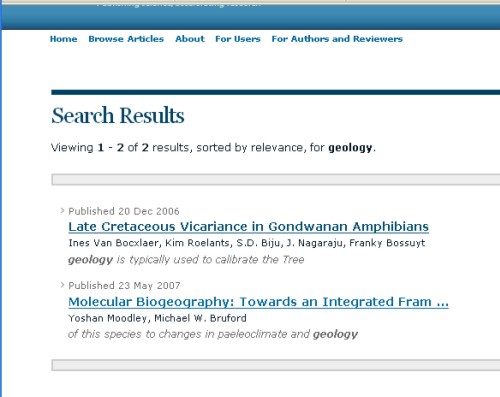I’ve been pondering this question for a while now, and Brian’s discussion about a possible geology blog carnival gives it some topicality: why is it that so few geologists seem to have exploited the possibilities provided by the internet? Even if our numbers are growing – I’ve just added a jealousy-inducing Antarctic seismologist to my blogroll – compared to other disciplines like biology, or astronomy, the number of active geology blogs seems disproportionately small. And its not just blogging: if you search under ‘geology’ at the PLos ONE website you get this:

You could possibly add the paper about the sounds generated by black smokers, to that list, but it’s still pretty pathetic – it’s no wonder that there is no Earth Science category on the front page. With only 10 papers published since the beginning of the year, the story is no more encouraging at the open access EGU journal devoted to Earth Science. At Connotea, only 125 papers have been tagged ‘geology’, compared to several thousands for physics, and 10,000+ for biology; and Ron, a real pioneer in these matters, was forced to withdraw his GSA session on the Web 2.0 and geosciences due to a lack of interest.
Such evidence is anecdotal, of course, but it does back up a general impression that in general, my fellow geologists don’t really engage with the online world. The question is, why the reticence? A number of interacting factors spring to mind (and I’d be interested to hear other peoples thoughts on this). There’s the large amount of time many geologists spend out of the office on field trips, which can often (horrors) keep you off-line for weeks at a time. Traditional geology is also a fairly low-tech affair, requiring little more than a hammer, hand lens and notebook (and the Mark I human eyeball will suffice in a pinch), which might point to a slight technological conservatism. However, the addition of the GPS unit to the toolkit suggests that new technology will be embraced if found to be useful, so I suspect it might be more to do with the lack of commonly used professional tools which serve to demonstrate – by changing the way that scientists work – that the internet has potential beyond saving you a walk down to the library to read the latest papers. On-line genome databases and the ArXiv seem to serve this purpose in biology and physics, respectively: perhaps, then, the awesomeness of Google Earth, and other tools for collating and displaying spatial data, will eventually serve the same role in geology.
One thing I can’t believe is that the lack of geobloggers reflects a lack of interest in engaging with the public beyond that normally encountered in science. If anything, my experience has been the opposite: give a geologist an excuse to talk about rocks, and the problem is usually shutting him up. So my question to any geologists reading this blog, and don’t have their own, is this: why not? Not only is blogging fun, but by making me pay more attention to news and results outside my particular sub-field, it makes me a better and more well-rounded scientist. Also, just as in teaching, the necessity of explaining basic concepts and new results to a less expert audience increases my own understanding of the subject in question. So there are sound professional reasons for dipping your toes into the blogosphere, even if you don’t believe – as I do – that knowledge is there to be shared with as many people as possible, not hoarded, and it is a scientist’s duty to assist in the sharing.
Of course, from a purely selfish perspective, the apparently small footprint of geology on the web has been to my advantage: although I’d like to think that I’m a fairly decent writer, some of the opportunities that have passed my way are at least in part a result of there being very few geobloggers to choose from. Nice for me, but not so good if you want to build up a community. And I do; being a part of Scienceblogs has shown me how much can be achieved, and how much fun can be had, when you get like-minded and committed people together on the web. So come on people, get blogging, tagging, and open accessing. Or do you want the biologists to have all the fun?



Comments (12)